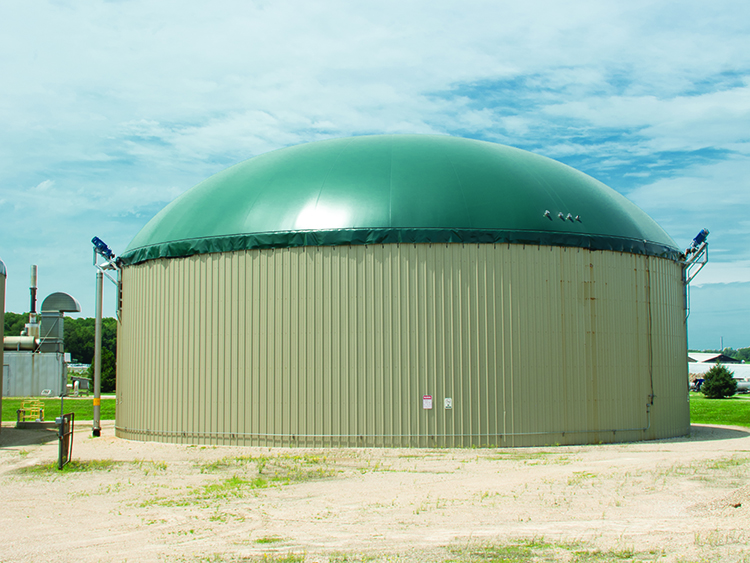
A newer opportunity in the sustainable energy space is the production of renewable natural gas, or RNG, which is created from organic materials such as food waste or animal manure. After manure travels through an anaerobic digester, the biogas produced is then processed into RNG that can be injected into a pipeline for distribution.
RNG companies are looking at livestock farms to become partners for production sites. While there is a lot of excitement surrounding these new agreements, it is important that farmers know what they are agreeing to before signing on the dotted line. In the webinar, “How to prepare for conversations with RNG developers,” Newtrient’s chief operating officer, Mark Stoermann, offered some insight and questions to consider before making a long-term commitment.
“It’s an exciting time because it’s an opportunity for the dairy industry to have a positive environmental impact but also to diversify the revenue stream,” Stoermann said. However, he pointed out that there is still a lot to learn in terms of putting agreements in writing.
“When it comes to contracts, it’s the Wild, Wild West, and that’s really true. Everybody and every project is different,” he shared. “What you need to do, as a producer, is really think about your operation and your future as you are getting ready to talk to people about these digester projects.”
Questions to ask yourself
Think about things that are very practical. For example, Stoermann said that digesters generally work better if they are not filled with sand. So, if your farm is using sand as a bedding material, you may be asked to switch to manure solids. “Is that something you are willing to do?” he asked. There are digesters that run on sand dairies, but he said they require more water and more revenue to be profitable.
Another factor he brought up is that there will be more traffic and more people on your property. Are you comfortable with that?
Stoermann also said to consider your nutrient management permitting and what you are currently committed to do. Then, envision the future of your operation.
“You need to think about the long-term future of the dairy and the project,” he said. He explained that these contracts tend to last 15 to 20 years. If you are not ready to make a commitment for that period of time, you need to talk about it with other people who are part of your dairy.
He said to consider the farm’s succession plan, and who will be taking over the operation someday. “What kind of expertise do they have? Will they want to be involved?” he questioned.
Additionally, determine if you want the developers to provide all the investment for the project, or if you want to invest in it. “That will probably change the dynamics of how the project looks,” he explained.
Know your costs
“Get with your accountant,” was the next advice Stoermann offered. He said you have to know the costs of running your dairy, especially the expenses associated with manure management.
What are you currently paying for permitting, manure collection, manure transportation, storage, and spreading? How valuable is manure to you as a fertilizer or bedding source? Are you getting any carbon credits? Are you willing to take in other products to get tipping fees?
“You really want to look at the whole picture,” he said. These projects require a large capital investment, and while the developer may be footing that bill, they are putting an expensive project next to another expensive project — your dairy.
“You want to make sure everyone will be happy with the project and get a fair return,” he said.
Questions to ask the developer
Stoermann shared these questions to ask the developer before committing to a project:
1. How many dairy projects have you developed, and how many are operating? Can I call and talk to your dairy partners?
2. How long do you need to conduct due diligence on this project?
3. What is the expected project term length? “Always make sure you understand the length of any agreement you sign, and be sure there is a termination of each agreement you sign,” he advised.
4. If significant upside occurs in the RNG market, how will you share that with the dairy? On the other hand, if there is significant downturn, what would you expect from the dairy? “Those are good discussions to have before you are committed and sign contracts,” Stoermann said.
5. What kind of termination clause do you have in the agreements? “It’s always important to have a conversation about termination clauses,” he said. “Everybody has to have a way to have a way out.”
6. Who owns the rights to develop future manure-related revenue?
7. What is your source of capital? Are you open to the dairy participating as an investor?
Again, Stoermann reminded that this is a fairly new market, and it pays to do your homework first. “It is the Wild West in some respects,” he reiterated. “You need to do your due diligence to understand what you are getting into.”
This article appeared in the August 2021 issue of Journal of Nutrient Management on pages 8 and 9. Not a subscriber? Click to get the print magazine.










